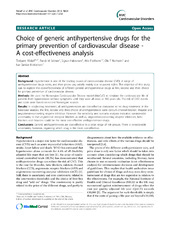Choice of generic antihypertensive drugs for the primary prevention of cardiovascular disease - A cost-effectiveness analysis
Wisløff, Torbjørn; Selmer, Randi M.; Halvorsen, Sigrun; Fretheim, Atle; Norheim, Ole Frithjof; Kristiansen, Ivar Sønbø
Peer reviewed, Journal article
Published version
Permanent lenke
https://hdl.handle.net/1956/8379Utgivelsesdato
2012-04-04Metadata
Vis full innførselSamlinger
Originalversjon
https://doi.org/10.1186/1471-2261-12-26Sammendrag
Background: Hypertension is one of the leading causes of cardiovascular disease (CVD). A range of antihypertensive drugs exists, and their prices vary widely mainly due to patent rights. The objective of this study was to explore the cost-effectiveness of different generic antihypertensive drugs as first, second and third choice for primary prevention of cardiovascular disease. Methods: We used the Norwegian Cardiovascular Disease model (NorCaD) to simulate the cardiovascular life of patients from hypertension without symptoms until they were all dead or 100 years old. The risk of CVD events and costs were based on recent Norwegian sources. Results: In single-drug treatment, all antihypertensives are cost-effective compared to no drug treatment. In the base-case analysis, the first, second and third choice of antihypertensive were calcium channel blocker, thiazide and angiotensin-converting enzyme inhibitor. However the sensitivity and scenario analyses indicated considerable uncertainty in that angiotensin receptor blockers as well as, angiotensin-converting enzyme inhibitors, beta blockers and thiazides could be the most cost-effective antihypertensive drugs. Conclusions: Generic antihypertensives are cost-effective in a wide range of risk groups. There is considerable uncertainty, however, regarding which drug is the most cost-effective.
Utgiver
BioMed CentralTidsskrift
BMC Cardiovascular DisordersOpphavsrett
Copyright 2012 Wisløff et al; licensee BioMed Central Ltd.Torbjørn Wisløff et al.; licensee BioMed Central Ltd.

